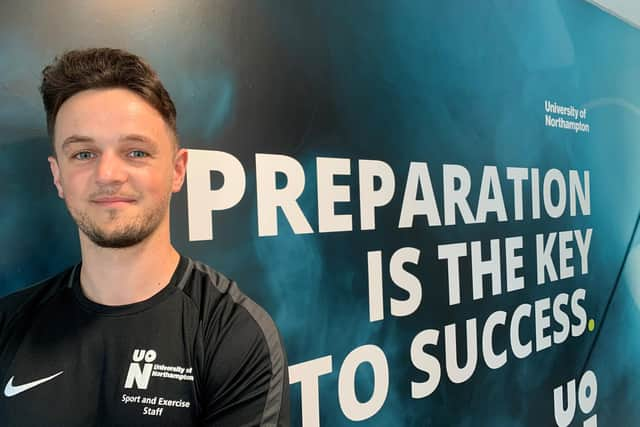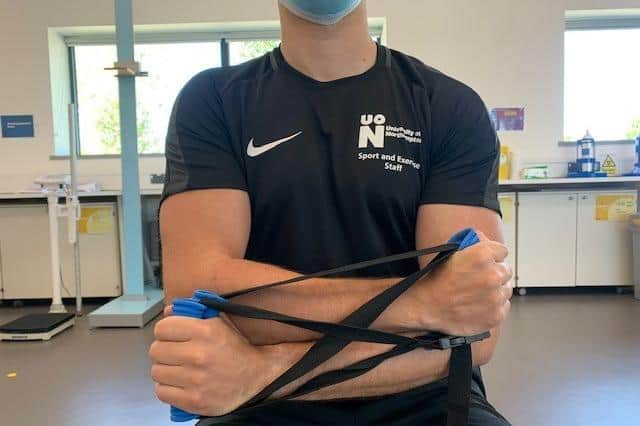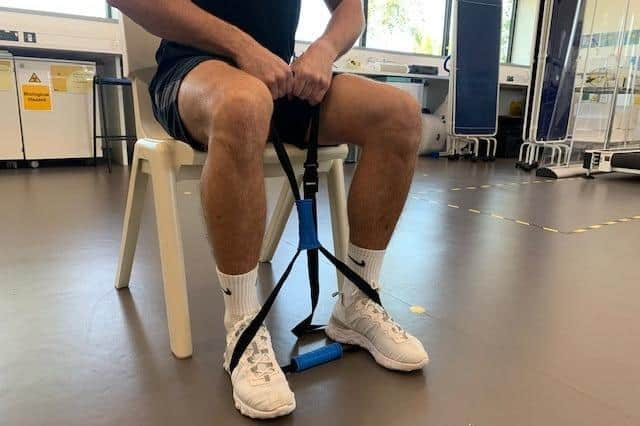University of Northampton launches study of new at-home kit to help adults with high blood pressure
and live on Freeview channel 276
A new study launched by PHD students from the University of Northampton (UoN) is seeking adult volunteers with high blood pressure to help test a new, potentially more convenient treatment for the condition.
Making use of a newly designed band (which the UoN team finalised in 2020), the study will see volunteers commit to an eight to ten-week programme of static exercises designed to improve their blood vessels' function. Volunteers will have to squeeze the band tightly from various positions in intervals of two minutes on, two minutes off, for a total of four times.
Advertisement
Hide AdAdvertisement
Hide AdIn doing this, the pressure created by the hold will reduce the flow of blood to certain blood vessels. Then, once the grip is released, the vessels will expand to incorporate all of the built-up blood drawn there by the added demand. This now-increased capacity, built up over weeks, has been shown to reduce blood pressure in the longer-term.


According to Ben Wright, 30, who is one of the PHD students and a graduate teaching assistant in Exercise Physiology at UoN, current treatments rely on expensive specialist equipment and even regular visits to medical facilities. If all goes well, the team hopes that their new band could be a cheaper and much more convenient alternative.
Mr Wright said: “Studies have shown that just four weeks of isometric exercise can lower blood pressure and may be just as effective as medication, and as good if not better than other types of exercise.
“There are now different methods of completing isometric exercise, common methods being using a hand grip device or bilateral leg extension, where you try to straighten both legs as you push against a specialist piece of equipment.”
Advertisement
Hide AdAdvertisement
Hide Ad“An advantage of isometric exercises is that they only take a short time. They have been shown to lower systolic blood pressure by about 5-8mmHg with only 12-14 minute sessions performed three times a week, over eight weeks. With rest time, that’s just eight minutes of contractions per session.


"It’s more time-efficient than going for a run and you can do them seated at home, so it’s a more attractive way to reduce blood pressure, and it’s suitable for more people.”
The study will be comparing results between two groups of volunteers, one which will use the new band, and another which will use an existing grip trainer.
It will also explore whether whole-body exercises using resistance bands are more effective than hand grip exercises, what effect they have on blood vessels throughout the body when larger muscle groups are used, and if the exercises can be done effectively at home.
Advertisement
Hide AdAdvertisement
Hide AdMr Wright said: "Currently, the devices on offer are quite expensive, or they require a lab and specialised staff. So we're taking different things that are more easily accessible than established, known methods and finding out how effective they can be.


"Our band is cheaper and we found it to be more versatile. It's something my research team and I have designed and the intention now is to show what it can do and find out if it's workable. We also want to see if the exercises we prescribe are effective.
"So the next trial is to bring it into the home and see if it can work as a more accessible and convenient method of treatment than what we have at the moment."
The study is open to adults of all ages with raised blood pressure, whether or not they are taking blood pressure medicines. Potential participants are also welcome to get in touch if they don’t know their blood pressure.
Advertisement
Hide AdAdvertisement
Hide AdVolunteers will need to visit Northampton around five times over 10 weeks and complete three short exercise sessions a week, at home for eight weeks.
If you are interested in taking part, or for further details, email [email protected]